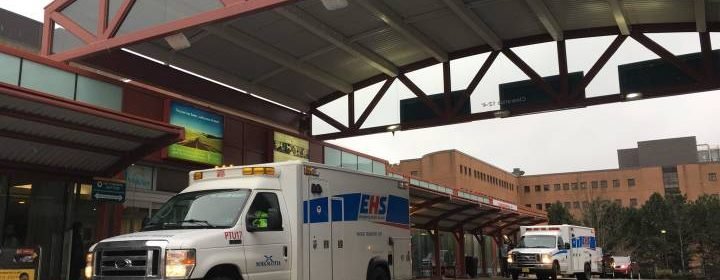Nova Scotia paramedics sounding alarm over ambulance wait times

In an emergency, seconds can make a difference. In the Halifax area, ambulances should arrive within eight minutes and 59 seconds of being called, but it’s becoming more common for people to wait longer.
“There was one event where there were three critically injured patients — near-death incidents — and those people waited one 28 minutes, one 37 minutes and one 48 minutes,” said Terry Chapman with the International Union of Operating Engineers, which represents paramedics. “The ambulance station was literally seven minutes away.”
Chapman admits in this instance, there were fatalities.
“I can’t specifically say the lack of ambulance caused them to die, but who knows if they would have if one had been there in seven minutes instead of 48.”
According to EHS, that under nine-minute target is being met in 90 per cent of cases but Chapman says that’s not what the union is seeing.
“Commonly, response times that we track are instead of being eight minutes and 59 seconds in a regular township, can be 45 minutes.”
To bring the issue to the public’s attention, the union started a campaign last year called Code Critical. Every time, there is a limited number of ambulances available in a given zone, they tweet it out.
On Monday, they tweeted out that at 8:40 a.m., there was only one unit available in Halifax. A tweet last week said at 7:30 p.m., there were no units available in HRM.
“It’s a public safety issue,” said Chapman.
But the director of provincial operations for EHS, Jeff Fraser, says the system is designed for that to happen.
“As we’re going to zero, we’re already contemplating moving resources in and around. The challenge is the more often that happens, the more challenging it is to operate in that environment.”
Crowded hospitals an issue
One of the reasons some zones end up with no ambulances available is because of offload delays.
Fraser says the system works on the assumption that ambulances are turned over within 20 minutes at the receiving hospital. But Chapman says too often, that’s not happening.
Paramedics can spend hours waiting to offload their patients and get back on the road.
“At one point [at the QE II] there were 38 ambulances not able to return to the street for a full day,” said Chapman.
Tim Guest with the Nova Scotia Health Authority says there are many reasons for offload delays.
“The emergency department cares for the sickest individual first, which at times could result in less acute individuals waiting and they could be an individual in an ambulance brought in.”
But he says offload issues and overcapacity challenges at the ER are symptoms that are showing the rest of the system isn’t working.
“It’s taking us, in a lot of circumstances, too long to move individuals to in-patient beds, to other facilities and other programs in a timely way to have the space available to care for individuals coming in.”
Paramedics overworked
The union says burnout is critical among its members, and members are tired and overworked.
“The long hours are happening because ambulances are pulled in to places where there are no available ambulances,” said Chapman.
“They’re stuck at hospitals and offload delays.”
He said often, paramedics won’t have time for lunch and are asked to work more than their standard 12-hour shift.
“In some cases, ambulances have been at the QE II Health Sciences Centre for 18 hours without leaving,” said Chapman.
“In a 12-hour shift, that means someone is six hours past due to getting home.”
All parties need to work together
All those involved say the issue is complex and cannot be fixed by one group, organization or department.
“We all need to be in the same room at the same time. We need to find what the hiccup is and everyone’s input to finding a design or pathway to creating a publicly safe image,” said Chapman.
Guest said too often, the ER department becomes a safety net for other programs.
“We’re the last resort,” he said. “That’s why it’s vital when we say it’s going to take all of us collectively working together to make a difference to this situation.”
Health Minister Randy Delorey says he has been meeting with various groups already about the issue and points to the Dartmouth General as a model that can be implemented elsewhere.
“Dartmouth General about a year ago implemented a new program that changed the way they manage transfers from paramedics into the hospital system and it’s had very positive results.”
As for organizing a meeting to have all parties to get together in the same room, he says he is unaware if that has happened in the past, and there are no plans for such a meeting in the works.
Source: Read Full Article
